牛津译林版(2019)必修二Unit 4 Exploring literature Extended reading教案配套课件(共28张PPT)
文档属性
| 名称 | 牛津译林版(2019)必修二Unit 4 Exploring literature Extended reading教案配套课件(共28张PPT) | 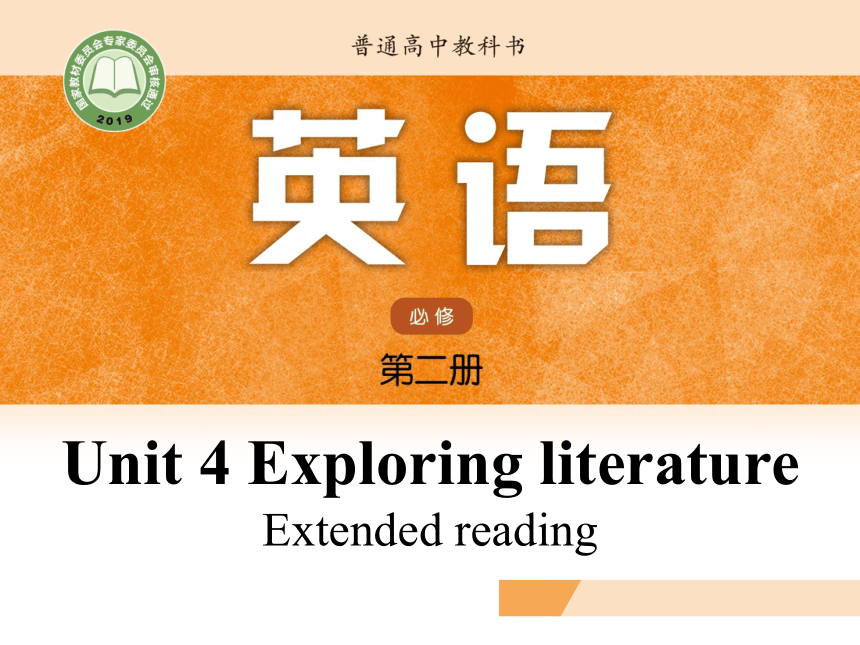 | |
| 格式 | pptx | ||
| 文件大小 | 6.3MB | ||
| 资源类型 | 教案 | ||
| 版本资源 | 牛津译林版(2019) | ||
| 科目 | 英语 | ||
| 更新时间 | 2022-12-28 15:07:31 | ||
图片预览

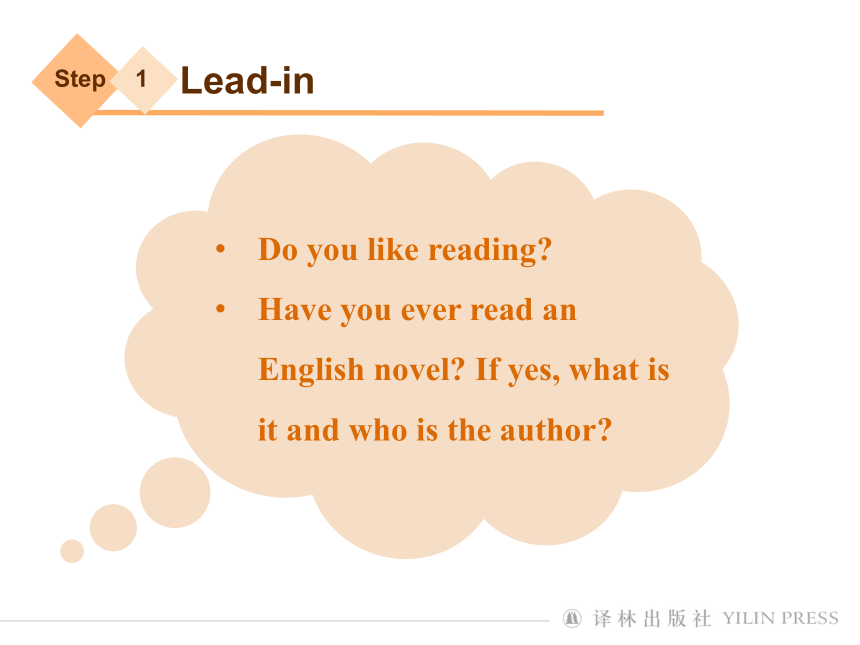
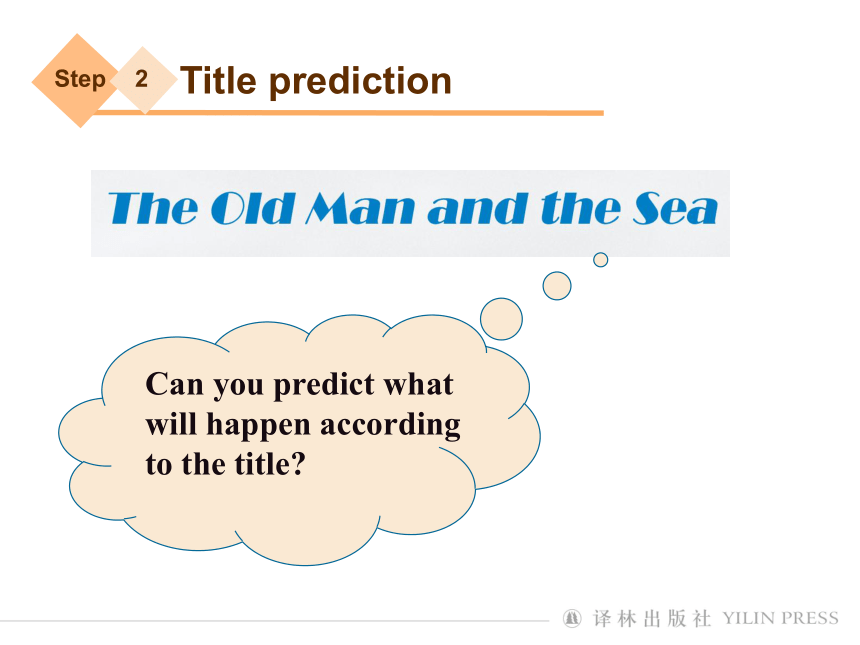
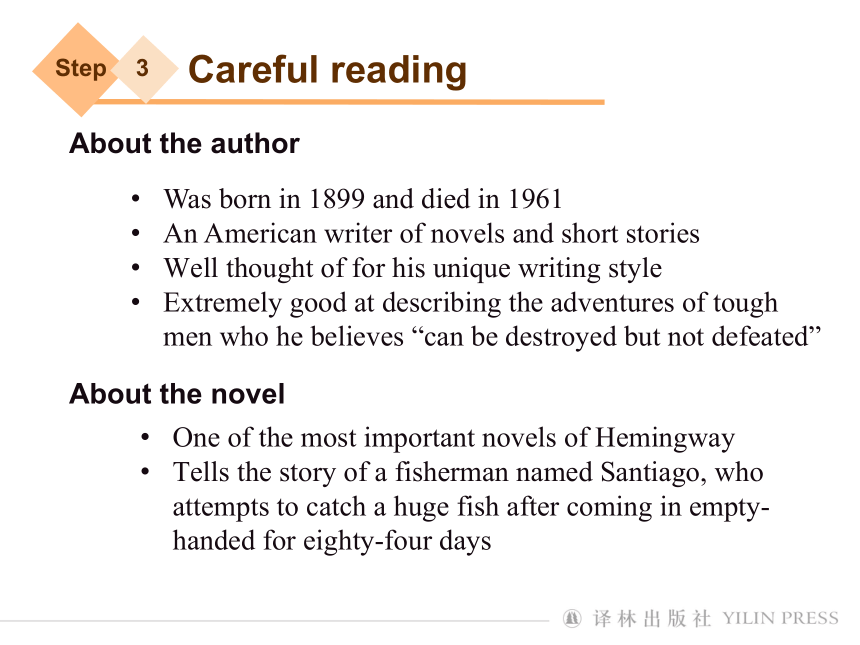
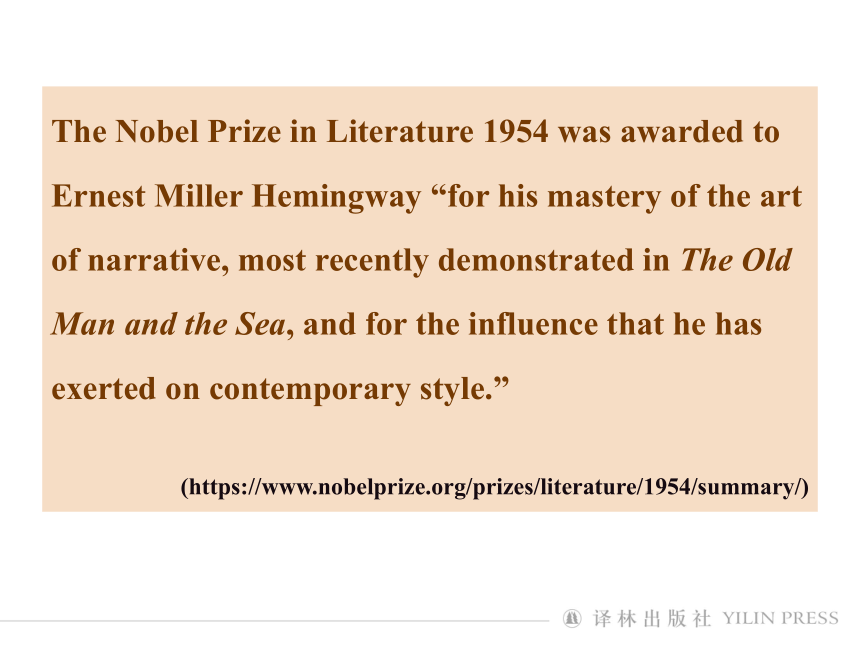
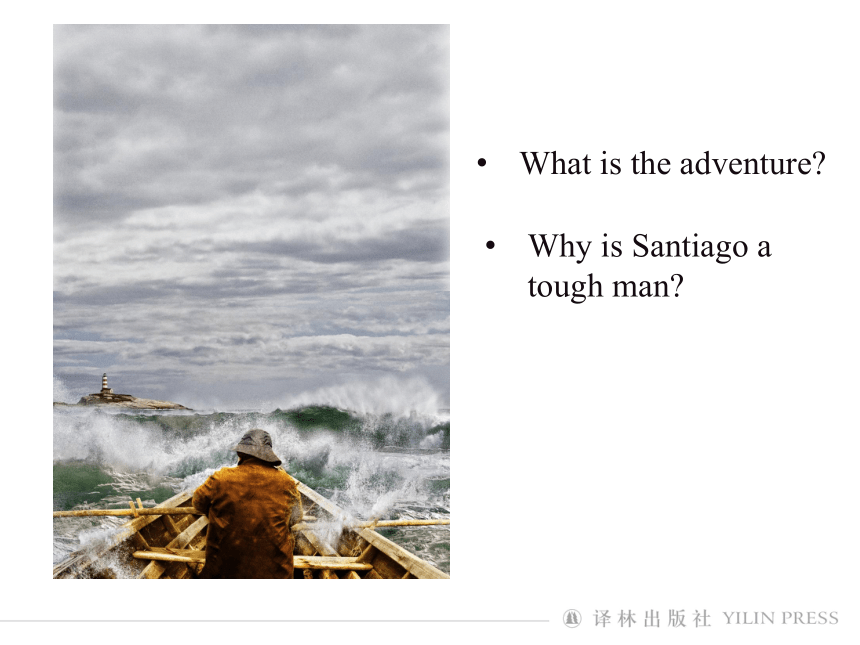
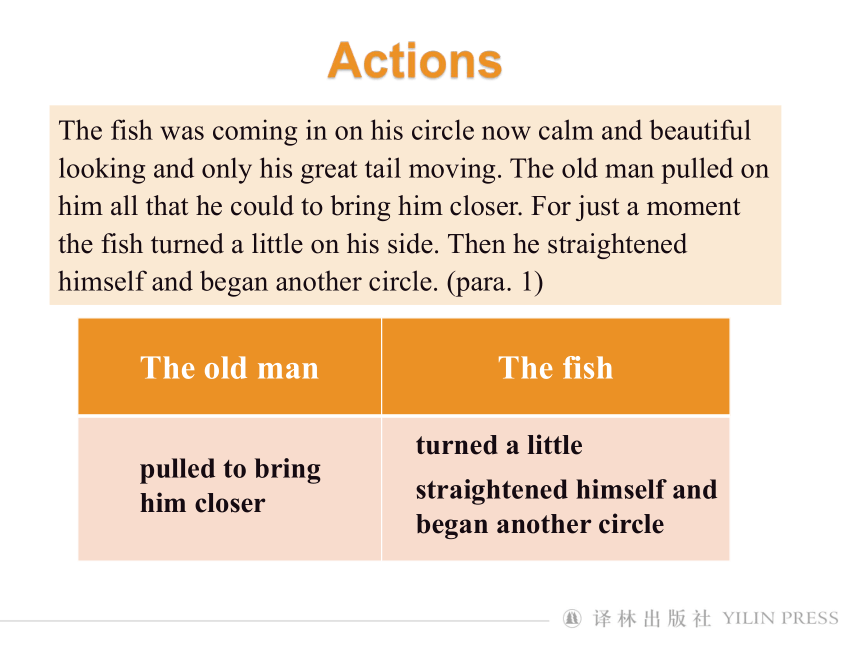
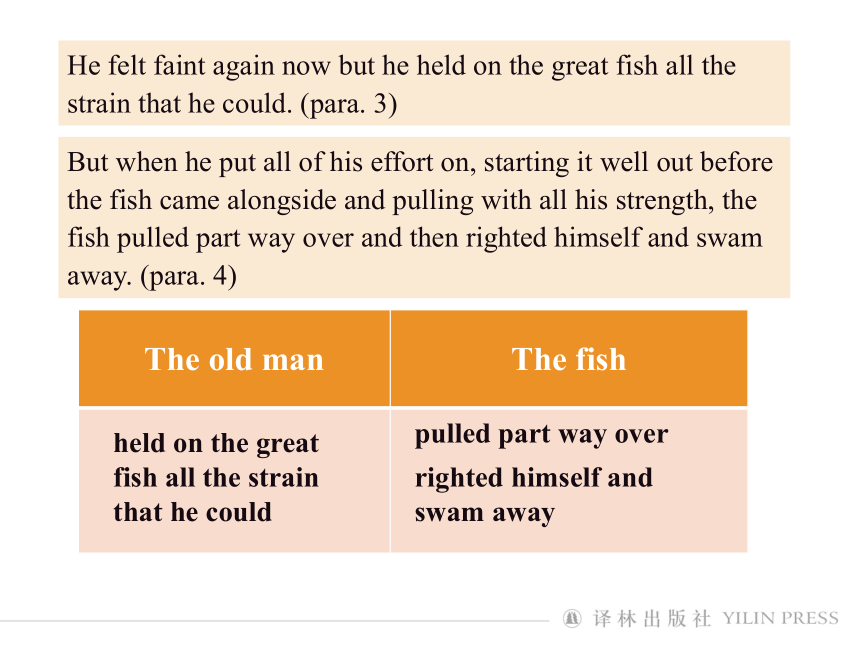
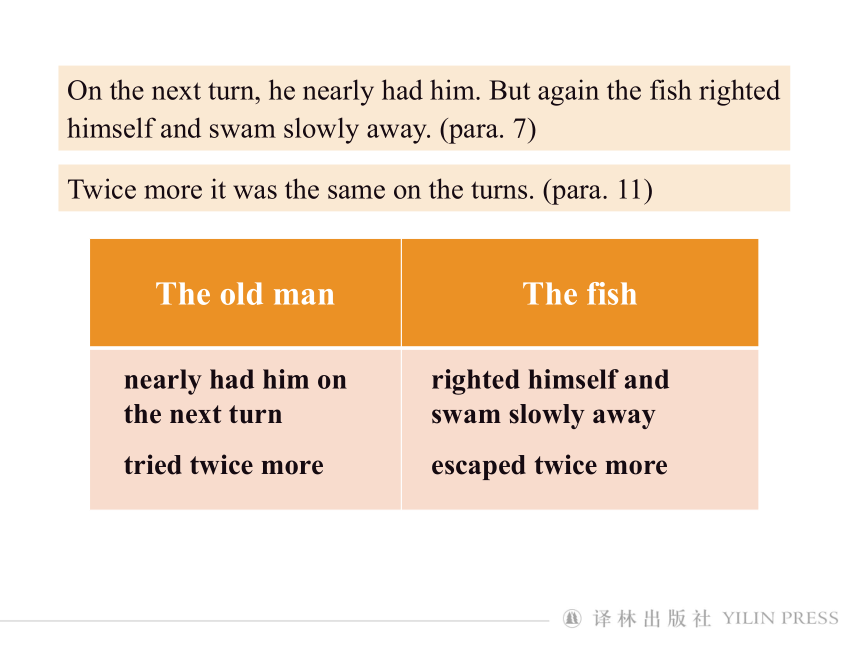
文档简介
(共28张PPT)
Unit 4 Exploring literature
Extended reading
Lead-in
1
Step
Do you like reading
Have you ever read an English novel If yes, what is it and who is the author
Title prediction
Step
2
Can you predict what will happen according to the title
About the author
Was born in 1899 and died in 1961
An American writer of novels and short stories
Well thought of for his unique writing style
Extremely good at describing the adventures of tough men who he believes “can be destroyed but not defeated”
About the novel
One of the most important novels of Hemingway
Tells the story of a fisherman named Santiago, who attempts to catch a huge fish after coming in empty-handed for eighty-four days
Careful reading
Step
3
The Nobel Prize in Literature 1954 was awarded to Ernest Miller Hemingway “for his mastery of the art of narrative, most recently demonstrated in The Old Man and the Sea, and for the influence that he has exerted on contemporary style.”
(https://www.nobelprize.org/prizes/literature/1954/summary/)
What is the adventure
Why is Santiago a tough man
The old man The fish
pulled to bring him closer
turned a little
straightened himself and began another circle
The fish was coming in on his circle now calm and beautiful looking and only his great tail moving. The old man pulled on him all that he could to bring him closer. For just a moment the fish turned a little on his side. Then he straightened himself and began another circle. (para. 1)
Actions
The old man The fish
held on the great fish all the strain that he could
pulled part way over
righted himself and swam away
He felt faint again now but he held on the great fish all the strain that he could. (para. 3)
But when he put all of his effort on, starting it well out before the fish came alongside and pulling with all his strength, the fish pulled part way over and then righted himself and swam away. (para. 4)
The old man The fish
nearly had him on the next turn
righted himself and swam slowly away
On the next turn, he nearly had him. But again the fish righted himself and swam slowly away. (para. 7)
tried twice more
escaped twice more
Twice more it was the same on the turns. (para. 11)
The old man The fish
tried it once more
righted himself and swam off again slowly with the great tail weaving in the air
He tried it once more and he felt himself going when he turned the fish. The fish righted himself and swam off again slowly with the great tail weaving in the air. (para. 13)
tried it again
escaped again
He tried it again and it was the same. (para. 15)
Though the fish ____________ every time, the old man never ____________ and always ____________.
swam away
gave up
tried again
Physical conditions
He felt faint again now ... (para. 3)
He had been on the point of feeling himself go each time. (para. 12)
His mouth was too dry to speak but he could not reach for the water now. (para. 6)
... although his hands were mushy now and he could only see well in flashes. (para. 14)
... he said in a voice he could hardly hear. (para. 10)
After coming in empty-handed for 84 days …
Thoughts
“I moved him,” the old man said. “I moved him then.” (para. 2)
“Fish,” the old man said. “Fish, you are going to have to die anyway. Do you have to kill me too ” (para. 5)
I moved him, he thought. Maybe this time I can get him over. Pull, hands, he thought. Hold up, legs. Last for me, head. Last for me. You never went. This time I’ll pull him over. (para. 3)
That way nothing is accomplished, he thought. His mouth was too dry to speak but he could not reach for the water now. I must get him alongside this time, he thought. I am not good for many more turns. Yes you are, he told himself. You’re good for ever. (para. 6)
“Clear up, head,” he said in a voice he could hardly hear. “Clear up.” (para. 10)
Now you are getting confused in the head, he thought. You must keep your head clear. Keep your head clear and know how to suffer like a man. Or a fish, he thought. (para. 9)
I do not know, the old man thought. He had been on the point of feeling himself go each time. I do not know. But I will try it once more. (para. 12)
So he thought, and he felt himself going before he started; I will try it once again. (para. 15)
I’ll try it again, the old man promised ... (para. 14)
can be but
destroyed
not defeated
faint/thirsty
in a voice he could hardly hear
on the point of feeling himself go
his hands were mushy now and he could only see well in flashes
I will try it once again.
I must get him alongside this time.
Come on and kill me. I do not care who kills who.
You must keep your head
clear. Keep your head clear and know how to suffer like a man.
Physically
Mentally
Contrast
physically
mentally.
A tough man
Critical reading
Step
4
Describe the old man’s personalities.
Determined
Brave
Fearless
Strong-willed
Confident
Optimistic
Persistent
Unyielding
Analyse Hemingway’s writing style.
Hemingway’s writing style
Simple language
Small words
Short sentences
Vivid description of mental activities
Symbolism
Few comments from the writer/narrator
The fish was coming in on his circle now calm and beautiful looking and only his great tail moving. The old man pulled on him all that he could to bring him closer. For just a moment the fish turned a little on his side. Then he straightened himself and began another circle. (para. 1)
Short and simple sentences
I moved him, he thought. Maybe this time I can get him over. Pull, hands, he thought. Hold up, legs. Last for me, head. Last for me. You never went. This time I’ll pull him over. (para. 3)
Vivid description of mental activities
I must get him alongside this time, he thought. I am not good for many more turns. Yes you are, he told himself. You’re good for ever. (para. 6)
You are killing me, fish, the old man thought. But you have a right to. Never have I seen a greater, or more beautiful, or a calmer or more noble thing than you, e on and kill me. I do not care who kills who. (para. 8)
Hemingway’s Iceberg Theory
If a writer of prose knows enough about what he is writing about he may omit things that will have a feeling of those things as strongly as though the writer had stated them. The dignity of movement of an iceberg is due to only one-eighth of it being above water. A good writer does not need to reveal every detail of a character or action.
(Death in the Afternoon, by Ernest Hemingway)
Iceberg principle:
Concise language
Deep, complicated thoughts and meanings underneath
I always try to write on the principle of the iceberg. There is seven-eighths of it underwater for every part that shows. (Hemingway)
The old man
The fish
The sea
People’s strong will
The harsh
reality
People’s goal and dream
Explore the theme of the novel.
The novel highlights the theme that man can be destroyed but not defeated. It is a representation of life as a struggle against forces in which only a partial victory is possible.
Honour in struggle, defeat and death
Santiago embodies Hemingway’s definition of courage as “grace under pressure”. He never loses dignity in the face of death. The glory and honour come not from his battle itself but from his pride and determination to fight.
Pride as the source of greatness and determination
Sharing
Step
5
Share your story of dealing with difficulties in life or study.
The attraction of literature lies more in what it awakens in us than what it says.
—William J. Long
Homework
1. Write down your reflection after learning this excerpt.
2. Read the rest of The Old Man and the Sea and find what happened before and after the excerpt.
Unit 4 Exploring literature
Extended reading
Lead-in
1
Step
Do you like reading
Have you ever read an English novel If yes, what is it and who is the author
Title prediction
Step
2
Can you predict what will happen according to the title
About the author
Was born in 1899 and died in 1961
An American writer of novels and short stories
Well thought of for his unique writing style
Extremely good at describing the adventures of tough men who he believes “can be destroyed but not defeated”
About the novel
One of the most important novels of Hemingway
Tells the story of a fisherman named Santiago, who attempts to catch a huge fish after coming in empty-handed for eighty-four days
Careful reading
Step
3
The Nobel Prize in Literature 1954 was awarded to Ernest Miller Hemingway “for his mastery of the art of narrative, most recently demonstrated in The Old Man and the Sea, and for the influence that he has exerted on contemporary style.”
(https://www.nobelprize.org/prizes/literature/1954/summary/)
What is the adventure
Why is Santiago a tough man
The old man The fish
pulled to bring him closer
turned a little
straightened himself and began another circle
The fish was coming in on his circle now calm and beautiful looking and only his great tail moving. The old man pulled on him all that he could to bring him closer. For just a moment the fish turned a little on his side. Then he straightened himself and began another circle. (para. 1)
Actions
The old man The fish
held on the great fish all the strain that he could
pulled part way over
righted himself and swam away
He felt faint again now but he held on the great fish all the strain that he could. (para. 3)
But when he put all of his effort on, starting it well out before the fish came alongside and pulling with all his strength, the fish pulled part way over and then righted himself and swam away. (para. 4)
The old man The fish
nearly had him on the next turn
righted himself and swam slowly away
On the next turn, he nearly had him. But again the fish righted himself and swam slowly away. (para. 7)
tried twice more
escaped twice more
Twice more it was the same on the turns. (para. 11)
The old man The fish
tried it once more
righted himself and swam off again slowly with the great tail weaving in the air
He tried it once more and he felt himself going when he turned the fish. The fish righted himself and swam off again slowly with the great tail weaving in the air. (para. 13)
tried it again
escaped again
He tried it again and it was the same. (para. 15)
Though the fish ____________ every time, the old man never ____________ and always ____________.
swam away
gave up
tried again
Physical conditions
He felt faint again now ... (para. 3)
He had been on the point of feeling himself go each time. (para. 12)
His mouth was too dry to speak but he could not reach for the water now. (para. 6)
... although his hands were mushy now and he could only see well in flashes. (para. 14)
... he said in a voice he could hardly hear. (para. 10)
After coming in empty-handed for 84 days …
Thoughts
“I moved him,” the old man said. “I moved him then.” (para. 2)
“Fish,” the old man said. “Fish, you are going to have to die anyway. Do you have to kill me too ” (para. 5)
I moved him, he thought. Maybe this time I can get him over. Pull, hands, he thought. Hold up, legs. Last for me, head. Last for me. You never went. This time I’ll pull him over. (para. 3)
That way nothing is accomplished, he thought. His mouth was too dry to speak but he could not reach for the water now. I must get him alongside this time, he thought. I am not good for many more turns. Yes you are, he told himself. You’re good for ever. (para. 6)
“Clear up, head,” he said in a voice he could hardly hear. “Clear up.” (para. 10)
Now you are getting confused in the head, he thought. You must keep your head clear. Keep your head clear and know how to suffer like a man. Or a fish, he thought. (para. 9)
I do not know, the old man thought. He had been on the point of feeling himself go each time. I do not know. But I will try it once more. (para. 12)
So he thought, and he felt himself going before he started; I will try it once again. (para. 15)
I’ll try it again, the old man promised ... (para. 14)
can be but
destroyed
not defeated
faint/thirsty
in a voice he could hardly hear
on the point of feeling himself go
his hands were mushy now and he could only see well in flashes
I will try it once again.
I must get him alongside this time.
Come on and kill me. I do not care who kills who.
You must keep your head
clear. Keep your head clear and know how to suffer like a man.
Physically
Mentally
Contrast
physically
mentally.
A tough man
Critical reading
Step
4
Describe the old man’s personalities.
Determined
Brave
Fearless
Strong-willed
Confident
Optimistic
Persistent
Unyielding
Analyse Hemingway’s writing style.
Hemingway’s writing style
Simple language
Small words
Short sentences
Vivid description of mental activities
Symbolism
Few comments from the writer/narrator
The fish was coming in on his circle now calm and beautiful looking and only his great tail moving. The old man pulled on him all that he could to bring him closer. For just a moment the fish turned a little on his side. Then he straightened himself and began another circle. (para. 1)
Short and simple sentences
I moved him, he thought. Maybe this time I can get him over. Pull, hands, he thought. Hold up, legs. Last for me, head. Last for me. You never went. This time I’ll pull him over. (para. 3)
Vivid description of mental activities
I must get him alongside this time, he thought. I am not good for many more turns. Yes you are, he told himself. You’re good for ever. (para. 6)
You are killing me, fish, the old man thought. But you have a right to. Never have I seen a greater, or more beautiful, or a calmer or more noble thing than you, e on and kill me. I do not care who kills who. (para. 8)
Hemingway’s Iceberg Theory
If a writer of prose knows enough about what he is writing about he may omit things that will have a feeling of those things as strongly as though the writer had stated them. The dignity of movement of an iceberg is due to only one-eighth of it being above water. A good writer does not need to reveal every detail of a character or action.
(Death in the Afternoon, by Ernest Hemingway)
Iceberg principle:
Concise language
Deep, complicated thoughts and meanings underneath
I always try to write on the principle of the iceberg. There is seven-eighths of it underwater for every part that shows. (Hemingway)
The old man
The fish
The sea
People’s strong will
The harsh
reality
People’s goal and dream
Explore the theme of the novel.
The novel highlights the theme that man can be destroyed but not defeated. It is a representation of life as a struggle against forces in which only a partial victory is possible.
Honour in struggle, defeat and death
Santiago embodies Hemingway’s definition of courage as “grace under pressure”. He never loses dignity in the face of death. The glory and honour come not from his battle itself but from his pride and determination to fight.
Pride as the source of greatness and determination
Sharing
Step
5
Share your story of dealing with difficulties in life or study.
The attraction of literature lies more in what it awakens in us than what it says.
—William J. Long
Homework
1. Write down your reflection after learning this excerpt.
2. Read the rest of The Old Man and the Sea and find what happened before and after the excerpt.
